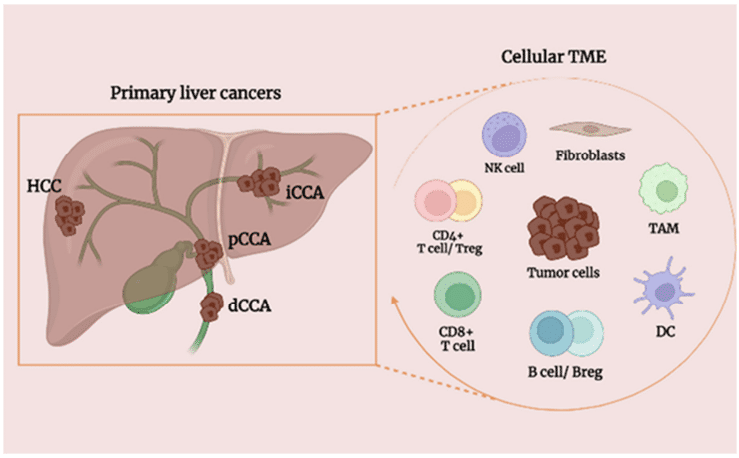NAA Associated Primary Liver Cancer
Primary liver cancer (PLC) is the second leading cause of cancer-related death worldwide and become a major public health concern. With decade years of experience in cancer therapy and disease diagnosis, the scientific team at Creative Biolabs can provide customers with comprehensive natural autoantibodies (NAA)-related services namely NAA services for PLC to promote your project progress.
Primary Liver Cancer Introduction
PLC is one of the common malignant tumors. Due to its insidious onset, nonspecific presenting symptoms in its early stage, and quick progression, PLC usually has been in the advanced stage or develops distant metastasis when it is confirmed. The main clinical manifestations of PLC includes pain in the hepatic region, loss of appetite, emaciation, weakness, and fever. PLC comprises a heterogeneous group of malignant tumors with different histologic features and unfavorable prognosis that range from intrahepatic cholangiocarcinoma (iCCA) and hepatocellular carcinoma (HCC) to mixed iCCA and HCC, pediatric neoplasm hepatoblastoma and the fibrolamellar HCC. Among these, iCCA and HCC are the most common PLCs. Risk factors for iCCA development include primary sclerosing cholangitis, biliary duct cysts, hepatolithiasis and parasitic biliary infestation with flukes. The main risk factors associated with HCC include viral hepatitis (HBV, and/or HCV), alcohol abuse and non-alcoholic fatty liver disease in patients with metabolic syndrome and diabetes. Other co-factors of HCC development, such as aflatoxin B1 and tobacco, increase the incidence of the disease if other common risk factors are present.
 Fig.1 Schematic representation of the anatomic site of PLC and the cellular components of the tumor microenvironment (TME).1
Fig.1 Schematic representation of the anatomic site of PLC and the cellular components of the tumor microenvironment (TME).1
Molecular studies have identified adult hepatocytes as the cell of origin. These cells have been proposed to transform directly into HCC cells (via a sequence of genetic alterations), to dedifferentiate into hepatocyte precursor cells (which then become HCC cells that express progenitor cell markers), or to transdifferentiate into biliary-like cells (which give rise to iCCA). Alternatively, progenitor cells also give rise to HCCs and iCCAs with markers of progenitor cells.
The Importance of NAA in PLC Diagnosis
Majority of patients with PLC are not candidates for curative therapies such as surgical resection or orthotopic liver transplantation due to tumor size, vascular invasion, or underlying comorbidities. Therefore, utilizing disease-specific NAA to achieve cancer early diagnosis is of great significance. Liver-related autoantibodies are very significant for the correct diagnosis and classification of PLC. Serum alpha-fetoprotein (AFP) and lectin reactive AFP are key indicators and the most specific tumor markers for the diagnosis of PLC. They have been widely used for the screening, early diagnosis, post-operative monitoring, and follow-up of PLC. Other biomarkers that can be used for the auxiliary diagnosis of PLC include HSP 60, ATP synthase, DNA topoisomerase II, cytokeratin, nucleoside diphosphate kinase A and so on. Here show several common targets in PLC that have already been developed to offer services by us.
| Natural Autoantibodies Targets in Primary Liver Cancer | ||
| Anti-Nucleophosmin 1 (NPM1) | Anti-DNA Topoisomerase II | Anti-Calreticulin |
| Anti-Cytokeratin 8 | Anti-Nucleoside Diphosphate Kinase A | Anti-ATP Synthase |
| Anti-CENPF | Anti-HSP 60 | Anti-α Fetoprotein (AFP) |
Since the early diagnosis of PLC is extremely critical for the treatment efficacy and long-term survival, highly attention should be paid to early screening and early surveillance. Equipped with state-of-the-art research, Creative Biolabs is dedicated to helping our clients to make progress in NAA research using our featured services. With expertise and dedication, Creative Biolabs will be your best companion in NAA-related services. Please do not hesitate to contact us for more information and a detailed quote, if the disease and related targets you interested is not mentioned above.
Reference
- Milardi, Giulia, and Ana Lleo. "Tumor-Infiltrating B Lymphocytes: Promising Immunotherapeutic Targets for Primary Liver Cancer Treatment." Cancers 15.7 (2023): 2182.
Choosing natural autoantibody (NAA) microarray to profile autoantibody repertoire and reveal novel disease's marker.
- NAA Services for Anti-Nucleophosmin (NPM) 1
- NAA Services for Anti-DNA Topoisomerase II
- NAA Services for Anti-Cytokeratin 8
- NAA Services for Anti-Nucleoside Diphosphate Kinase A
- NAA Services for Anti-CENPF
- NAA Services for Anti-α Fetoprotein (AFP)
Related Services:
- NAA Associated Lung Cancer
- NAA Associated Nasopharyngeal Carcinoma
- NAA Associated Gastric Cancer
- NAA Associated Pancreatic Cancer

